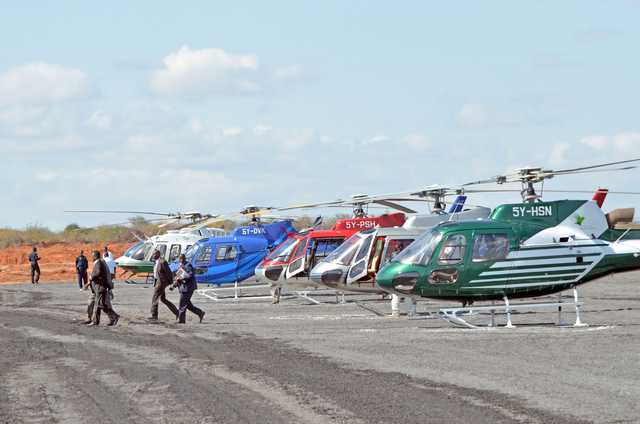‘Broke’ Kenya charts its way out of a financial hole – The East African
Kenyan government officials arrive in private helicopters at a temporary airstrip. President William Ruto has laid out a plan to manage his administration’s expenditure. PHOTO | FILE
The administration of President William Ruto will cut operational costs and run on a reduced budget.
In his inaugural speech to Parliament on Thursday, President Ruto told legislators that Kenya is broke and must make difficult decisions, among them cutting non-priority expenditure such as foreign trips for government officials and hefty allowances.
The president’s plan primarily involves ensuring that “we are living within our means”, he said.
President Ruto said Treasury is already working on how the financial year’s $27.4 billion budget can be reduced by at least $2.5 billion, a 10 percent cut.
“Next year, we will bring it further down so that, by the third year, we have a recurrent budget surplus,” President Ruto told parliamentarians in his first address to both Houses,
He added that it is “wrong and unsustainable” for the government to borrow to finance recurrent expenditure.
Kenya is currently facing hard economic times that have significantly dimmed its growth prospects. The president is assembling financial tools to revive and reconstruct the economy in order to deliver on his campaign promises to lower the cost of living.
The shilling is at its record lowest against the dollar, inflation is rising steadily, youth unemployment has increased, and the public debt and budget deficit go higher every year.
Kenya has a public debt of $70 billion, and its budget mostly covers debt obligations and recurrent expenditure.
Both the president and his deputy Rigathi Gachagua have admitted to having inherited a “dilapidated” economy, which will need reforms.
However, President Ruto’s proposal to reduce the budget was opposed by a section of the members of parliament, who say the state is already operating on a tight budget and cutting it further will affect key functions.
Junet Mohammed, an MP from the Azimio Coalition said, “I hope the Treasury will show us the items they want to cut from the budget because cutting the budget is like cutting off a body limb.”
At the same time, President Ruto wants the MPs to approve a supplementary budget, which will soon be tabled, for the government allocate an extra $25 million to the Judiciary and $414 million to the “Hustler Fund”.
More funds to the Judiciary, the president said, will help it attain autonomy, hence “acquire capacity and develop the infrastructure needed to more efficiently adjudicate and expeditiously conclude corruption cases”.
The “Hustler Fund”, a campaign promise, will provide low-cost credit to small-scale entrepreneurs and improve employment creation, President Ruto said. “Access to affordable credit is like a magic formula. It makes a huge difference in the rate of business growth,”
The president said the Credit Reference Bureau (CRB) should change its approach of blacklisting bad debtors into one of credit scoring system. The scoring system is international best practice.
But as the state coffers are “dry”, the president says there will be a need to reform the country’s tax system to be more equitable, efficient, and reflective of the ability to pay.
“We are over-taxing trade and under-taxing wealth. We will be proposing tax measures that begin to move us in the right direction,” he said.
To bring down the high costs of living and tame rising inflation, President Ruto said he will subsidise production rather than consumption.
Two weeks ago, the president announced the introduction of subsidised fertiliser, cutting retail prices by nearly half.
President Ruto said his administration is exploring further mechanisms to bring down the prices.
Housing, a problem affecting nearly two million households in Kenya, was also among key reforms the president suggested to the legislators. He said his administration will soon present “legislative proposals to provide a framework for a housing off-take plan”.
In Tanzania, official data estimates that more than 2,000 tonnes of illegal game meat is seized annually in the country.
With Ethiopia having rebuffed calls from AU, UN and others to halt offensive, regional and Western powers need to do more to ward off further…












